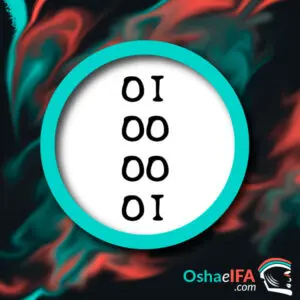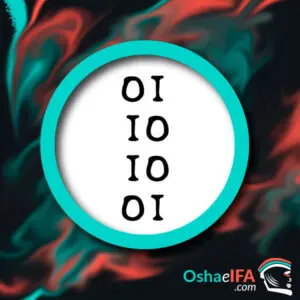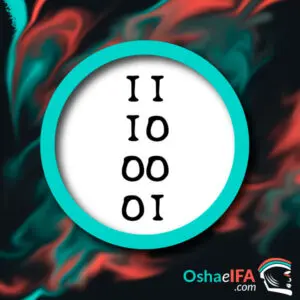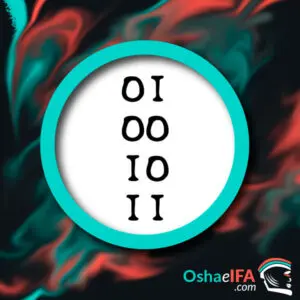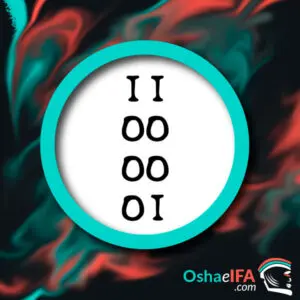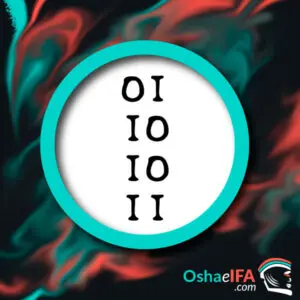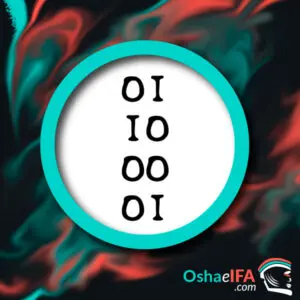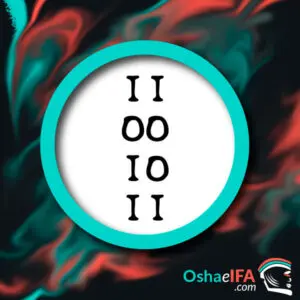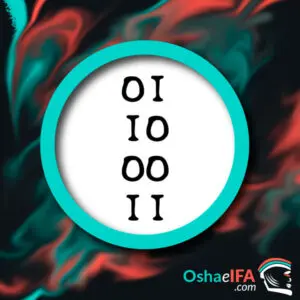Odi Ogunda (7-3): Meaning, recommendations, sayings and patakies
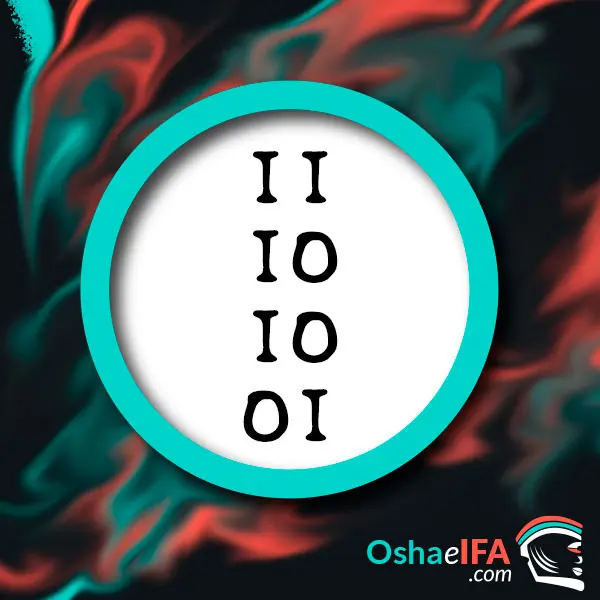
Odi Ogunda is one of the Odu of Ifa corresponding to the Book of Odi, this is the sign number 69 in the hierarchy of Ifa. Many good things are predicted in the life of the person, he will have long life and peace. Ifá sees him as a person who goes to work early and should continue to do so with a good attitude, since early in the morning he will find his fortunes. You will be rewarded for your actions.
In the odu Odi Ogunda is born:
- The ILU drum or messenger drum of the Kings.
- The trap and the lie.
- The great spirit of the DAHOMEY drum, symbolizing the TEGHESU SAMA.
- The forgetfulness of the view and the passing of the clouds.
- Recording and espionage.
- En odi ogunda the prohibition of corn seed oil ADIN is born to the Deities except OSANYIN.
- The medical operating room
- The woman is emptied. Your internal genital organs are removed (hysterectomy).
- You have to be careful with the dead and spiritual parties.
- Here: YEMAYA is asked to change houses.
What is the Odi Ogunda sign talking about?
- YEMAYA he ate coated ram to fix his derangements.
- It is said that the AWO should not do more than 2 Ifá.
- There are tragedies with children.
- When seen this Odu is blown from the belly out.
- Here OGUN made the iron plow.
The sign of Ifa Oddi Ogunda points out:
- He went to OBATALA traveled the world to see if the BABALAWOS had a good heart.
- Speak the impotence of men.
- The four cardinal points are fed.
- Here: The person has a bad temper.
- The kill Ikin was by divination to go down to earth.
- Be careful not to share the house with someone else.
- The person does Ifá without permission from the Guardian Angel.
- OGUN blocked the view of the Mayomberos.
- This Odu is used to fight against the faltón.
You can read: Odu of Ifa Ogunda Dio
Recommendations of the Odi Ogunda sign:
The person is recommended to take herbal baths and clean the house, as well as use the chain from OGUN to ELEGBA AND ORUNMILA.
When this Odu speaks OSORBO, IKU, ARUN AND OFO, works must be done quickly, because the person has little life left, death is upon him and the hole is open.
When the AWO sees this Odu, blow from the belly out.
This was where OBATALA He went out to travel the world to see if the BABALAWOS had a good heart, and he regretted his journey.
Here you have to be careful not to share the house or something else with another person.
Here OGUN covered the Mayomberos' eyes with grifa chicken head incense, Sacú Sacú and incense.
This Odu serves the BABALAWOS to fight against the faltón.
Here YEMAYA ate capon sheep to fix her internal disorders that did not allow her to live.
This Ifá the person came to life cursed, so he will present disorders in the course of his life, for which he must make sacrifice.
The AWO that has this Odu should not do more than two Ifá.
The person who appears in IKOFAFUN or AWAFAKAN, must do Santo, meet the Angel of his Guardian.
In this Odu the trap was born, because in order for a person to live well, they have to tell a lie to the world.
Prohibitions of this Ifa odu:
For this Odu he is fed to the four cardinal points in order to control his enemies and have victory.
In this Odu, espionage and voice recording are born.
How a black and white dog should be kept in the house, and her name is AYAFA.
It was in this Odu that corojo butter and corn oil went by divination before coming down to earth.
The person around this Odu is very stingy.
In this Ifá he points out that the person walks with inverted people and that is why there are gossip.
This Ifá sign is the auxiliary Odu of BABA OGUNDA MEJI.
Here OGUN is a bad shadow on the person.
It marks high blood pressure and in some cases low.
The person has to be careful, as he can leak blood from the mouth or the anus.
Here the person loses a garment.
Here a dove is fed at the door of the house.
Through Odi Ogunda, a procession is made inside the house with the interested party covered with a white sheet, where OBATALA is lowered and then his head is begged with two white doves, that the blood falls on OBATALA.
Sayings of the Odu Odi Ogunda:
- Debt to the dead is bad food.
- The war with the dead ends badly.
- The one they watch does not escape.
- The wisdom of character balances physical strength.
- Sexual promiscuity leads to disaster.
- Tell me who your friends are and I'll tell you who you are.
Ifa code of ethics of the odu Odi Ogunda:
The Awó does not do Ifa to anyone without the consent of his Guardian Angel.
You can read: Treaty of Oddun Odi Meyi
Ifa says in the odu Odi Ogunda:
Hold on to OGUN and care for him and his Guardian Angel. You plan to get married or get engaged; but two women are fighting for you because they want you only for themselves, don't be careless they want to kill you.
Do EBO so you don't get a throat sickness, as you may lose your voice. Don't listen to gossip so you don't get in trouble. Do EBO so you can win the lottery or take the money from an inheritance and pay off your debts. You have to do Santo. -He has lost many bellies or has lost many children. You want to get married but have a cross person.
There is a person in her house who is always crying because she does not want to give birth, she has already given birth to two boys and had to do EBO so that one of her children would not die.
Prayer of the Odu Odi Ogunda:
ODI OGUNDA BARALELE AWO OMI OYE BARALELE AWO AWO ABITI
ABARANILE YEWE IFA MOTORILAYE SHANGO OMO ALARA AWALADE NI SHANGO
BABINO BORIBO AWO, AWO ABITI MOYARE BINI BEYEKOFUN BURO BOBO BURE
BEYE AWO ABITI IFA KAFEREFUN ESHU MOYEBI WA ALARAMO ABITI.
Suggest:
OMO TILTING BARANILA AWO LERI IFA TILTING.
Ebo of the Odu Oddi Ogunda:
Work at the foot of OBATALA for IRE.
Two lines of husks will be made from the door of the street to the basket, leaving a good space between both lines, to walk between them. There is a procession with a white cloth, with OBATALA on the floor in front of the basket to the door of the house, playing the AGOGO of OBATALA and singing to OBATALA and the person covered by the white cloth, then it is returned to the basket, he is Ask the interested person for the head with two white doves on OBATALA and under the white cloth. Before starting the work, a white dove is given to the door of the house
with cocoa butter and husk.
Meaning of the odu Odi Ogunda
ODI OGUNDA talks about the wisdom and character it takes to balance physical strength.
Here sexual promiscuity leads to disaster.
In this Odu the Ashé of the person is in the mouth, he is a speaker, announcer, singer, teacher etc. It is recommended to take care of your mouth and that you always speak well.
Here was born the great ILU Drum or Messenger Drum of the Kings.
Luck arrives and if he finds an argument at home, he leaves.
It is necessary to do a spiritual mass for the EGUNS Protectors.
This sign of Ifa speaks of having arguments and problems with the children, for having lost the authority before them.
You should not hang out with people who have this Odu, as they will always bring problems of blood and justice.
Here the Medical Operating Room was born.
Here the woman is emptied, her uterus is removed and a hysterectomy is performed.
For this Odu surgical instruments are put on OGUN.
This is an Ifá of instability.
By this Odu, it is forbidden to catch the glow of the moon, it is called Ifá de la luna. As was the farmer's Ifá, who OGUN made the iron plow for him.
The sign Odi Ogunda speaks of division because here the Ifá tureen was divided.
For this Ifá, one must take care that an obsessive EGUN attaches it and throws it to the ground and dies from the blow.
This Odu indicates that the person has done Ifa without the permission of the Guardian Angel.
In this Odu the following diseases speak: The liver, blood pressure, removal of the genital organs (hysterectomy), surgical operations, nodules, menstrual disorders. The throat, vocal cords.
Patakie of the sign Odi Ogunda:
The mother and the EGUNS (dead).
On this road there was a woman whose mother was alive, and she liked to sing and dance, with a drum that she had.
Every day the daughter warned the mother not to play that drum any more, and the mother ignored her. So that the daughter would not see her, she went for the pleasure with the boys that she invited and celebrated their parties without the daughter knowing.
One day the daughter had a bad dream about her mother and the dead and she told her mother about it, and she ignored it. In view of this, the girl went to the house of the AWO of the town, who made her Osode and saw this Odu ODI OGUNDA where he ordered her to do EBO (the one indicated above).
The girl looked for all the things and went to do the EBO, moment in which the mother took the opportunity she took the little drum and left for the pleasure and the dead fell to her, she began to call her daughter, but she did not hear her and the dead they killed her.
Odi (Idi) Ogunda Ifa Traditional
I guess for Dun Dun, a diviner priest:
Dun dun gusta made divination for Dun-Dun, when he was going to receive many honors in different countries. He was advised to sacrifice with a dove, black soap, clothing, and animal hide. He made the sacrifices.
As soon as he arrived at Olofin's palace, he began to dance and the melody and rhythm of his music attracted every member of the royal house including the king. They gave him many presents.
Thus he repeated the performance in the palaces of the 16 kings and finally returned home a very rich man.
When he comes out in the consultation, the person will be told that Oba will give him a position of boss since he will make the appropriate sacrifices.
Eshu Elegua of the Odu Oddi Ogunda
ESHU JOROKI.
This Eshu is ARARA
DAHOMETAN. He is the one who keeps the great secrets of the drums, especially TEGHESU SAMA.
It is made of tall and narrow reef stone. It is sown in a pot and eyes and mouth of snails and their blade are put on it.
CARGO: Deer jar, hill land, river and sea sand, ILEKAN, mountain land, garbage land, cemetery, guinea peppers, ERO, OBI, KOLA, OSUN NABORU, owl head and tinea, gold, silver, copper, coral, 21 sticks and 7 herbs from ELEGUA.


